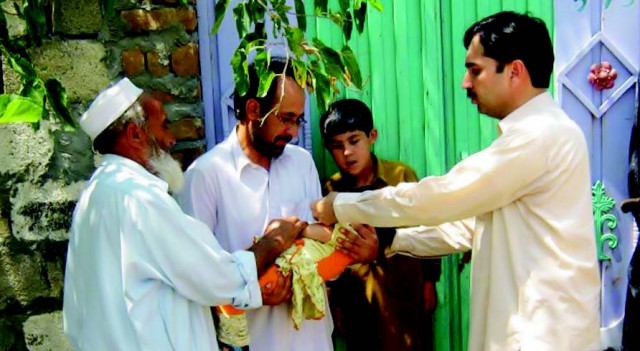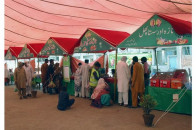Anti-polio drive: Suspended campaign puts 350,000 children at risk
Affected areas include North and South Waziristan and Bara Tehsil of Khyber Agency.

Pakistan on Monday postponed a polio immunisation campaign in parts of North and South Waziristan, jeopardising the health of more than 350,000 children, after the Taliban banned inoculations.
They have condemned the immunisation campaign, which began nationwide on Monday, as a cover for espionage. The espionage allegations come after Pakistani doctor Shakeel Afridi was jailed for 33 years in May, after helping the CIA find former al Qaeda leader Osama bin Laden in Abbotabad, using a hepatitis vaccination programme as cover.
Pakistan had claimed that 34 million children under the age of five would be targeted in the three-day polio immunisation campaign from Monday to Wednesday. The prime minister’s office said 22 vaccination points had been established on the Afghan-Pakistani border, but expected that a “substantial proportion” of children in Bara, South and North Waziristan would not be accessed. The Lancet medical journal has claimed that vaccination problems last year led to Pakistan’s highest number of polio cases in a decade, 198, compared to 144 in 2010.
“The campaign has been postponed in North and South Waziristan and Bara Tehsil of Khyber Agency,” Mazhar Nisar, in charge of the polio monitoring cell at the prime minister’s secretariat, said.
Officials in Miramshah, the main town of North Waziristan, said a meeting of tribal elders to discuss immunisation had been postponed due to a military curfew. In Khyber, administration official Irfanullah Wazir added that the target was to vaccinate 200,163 children, but conceded the campaign would be affected in parts of Bara and the Tirah valley, where 111,556 children need the drops.
“We will make every effort to reach the maximum number of children in those areas, with the help of security forces and lashkars,” Wazir added. Fawad Khan, director of health services in the tribal belt, stated last week that at least 160,000 children in North Waziristan and 80,000 in South Waziristan would be affected if polio drops are not administered.
Polio remains endemic only in Afghanistan, Pakistan and Nigeria. The highly infectious disease affects mainly children under five and can cause paralysis in a matter of hours. Some cases can be fatal.
Polio drive begins in Quetta
The three-day nationwide anti-polio campaign kicked off in Quetta on Monday. At least 228,410 children below the age of five will be vaccinated by 6,097 health workers and volunteers.
At least three polio cases were reported in Quetta in 2012, while approximately 73 cases were reported all over Balochistan in 2011, which places the province among the highest-risk areas contracting polio in the global ranking.
The campaign was inaugurated by a prominent religious figure Mufti Abdul Qayum, who had previously refused to allow anti-polio teams from administering the drops based on misconceived religious beliefs. However, after his two-year-old nephew Mehram contracted the crippling disease, he changed his mind. Now, he has made it his mission to ensure that every child living in the slums on Sabazal Road in Quetta be administered the polio jabs.
Anti-polio drive volunteer beaten up
An anti-polio drive volunteer suffered injuries after he was beaten up by a Pashtun family in the Golra Railway Station area, sector G-13 in Islamabad on Monday.
Mohsin Ali tried to administer polio drops during the ongoing nationwide polio campaign to a child belonging to the family. The family refused, resulting in an argument, which led to them beating Ali. He was taken to the Pakistan Institute of Medical Sciences (Pims) for treatment.
While talking to The Express Tribune, the prime minister’s focal person on the polio eradication campaign, Shahnaz Wazir Ali, strongly condemned the incident. “It is very unfortunate that such refusals are taking place in the capital,” Shahnaz said.
(WITH ADDITIONAL INPUT FROM AGENCIES)
Published in The Express Tribune, July 17th, 2012.



















COMMENTS
Comments are moderated and generally will be posted if they are on-topic and not abusive.
For more information, please see our Comments FAQ